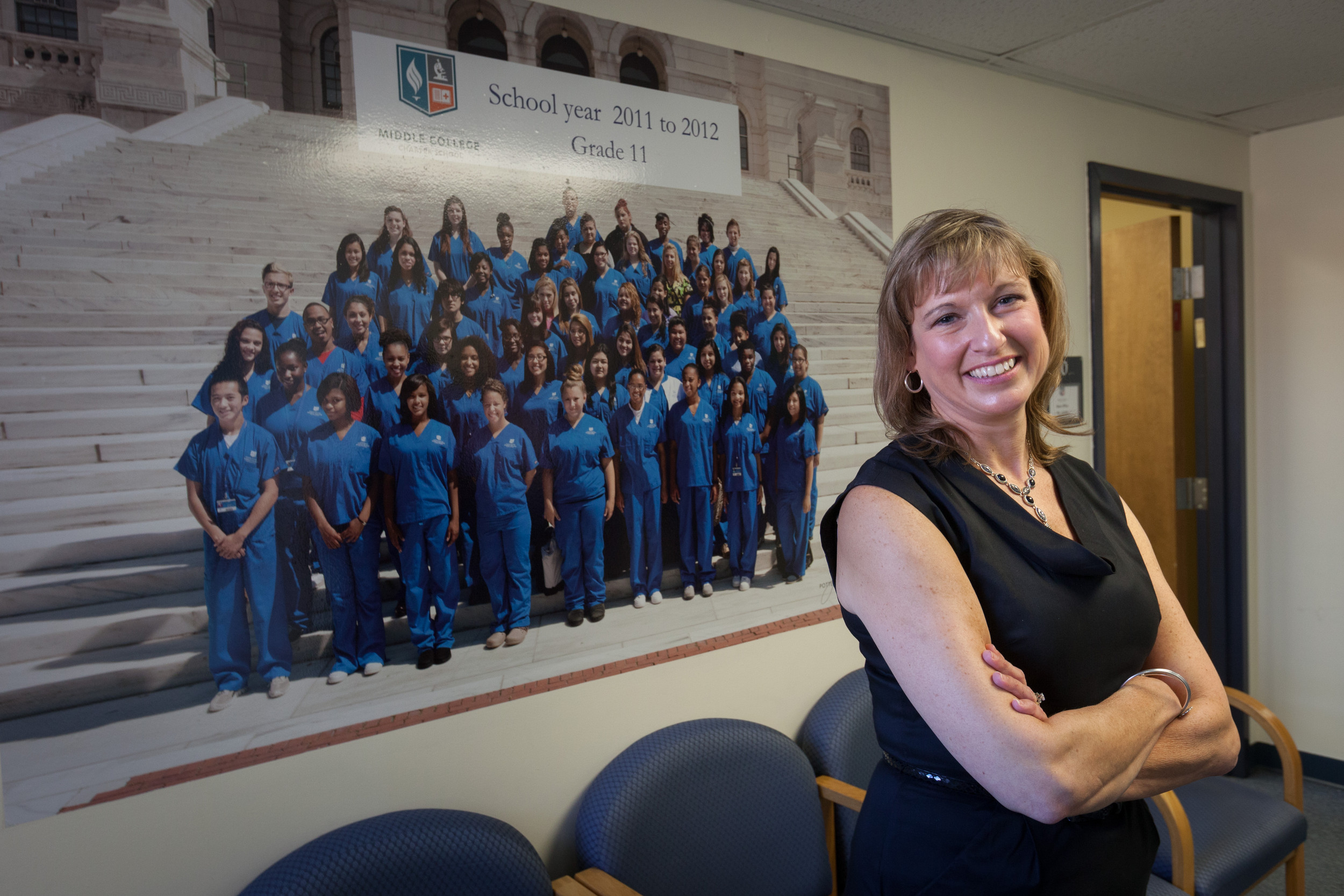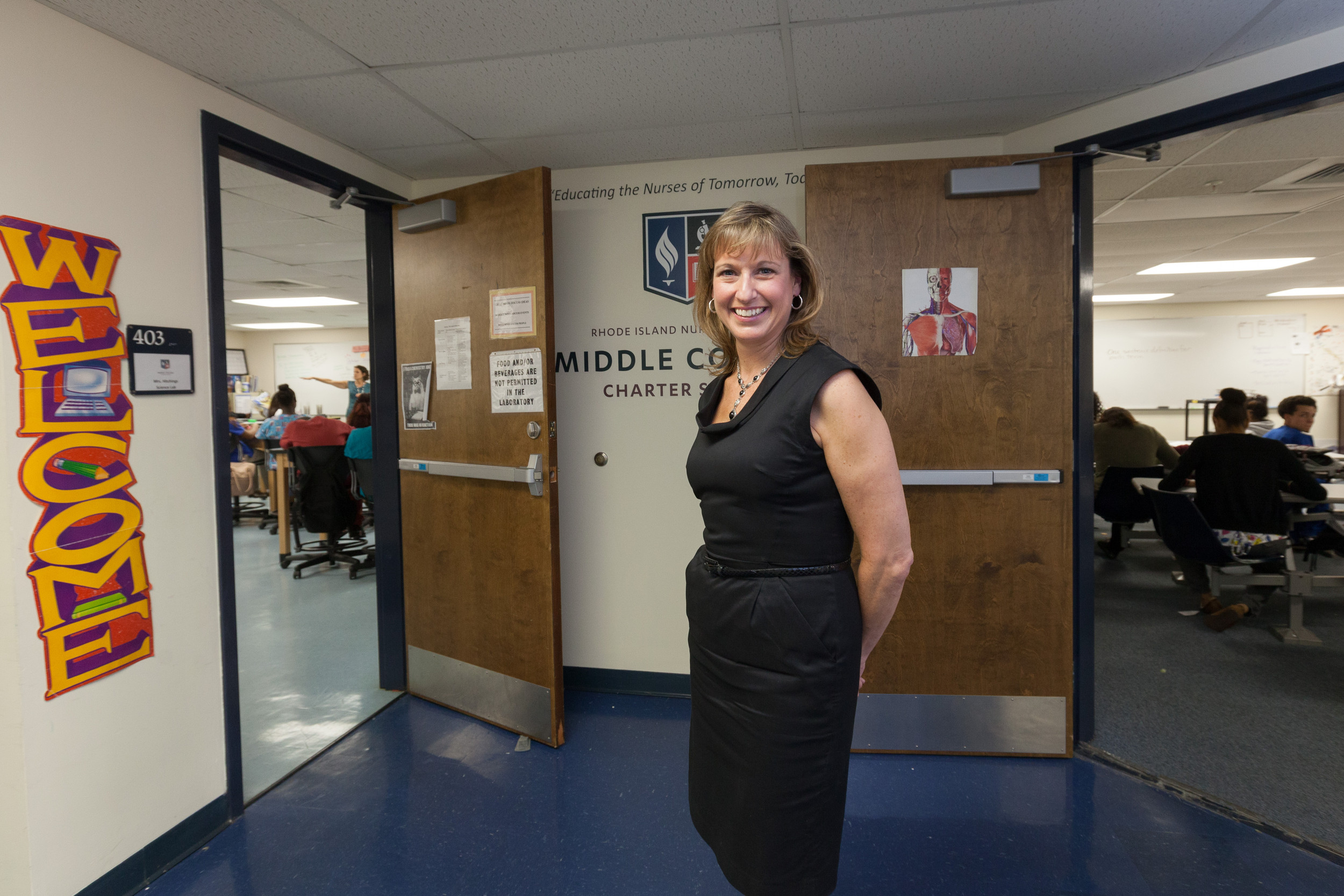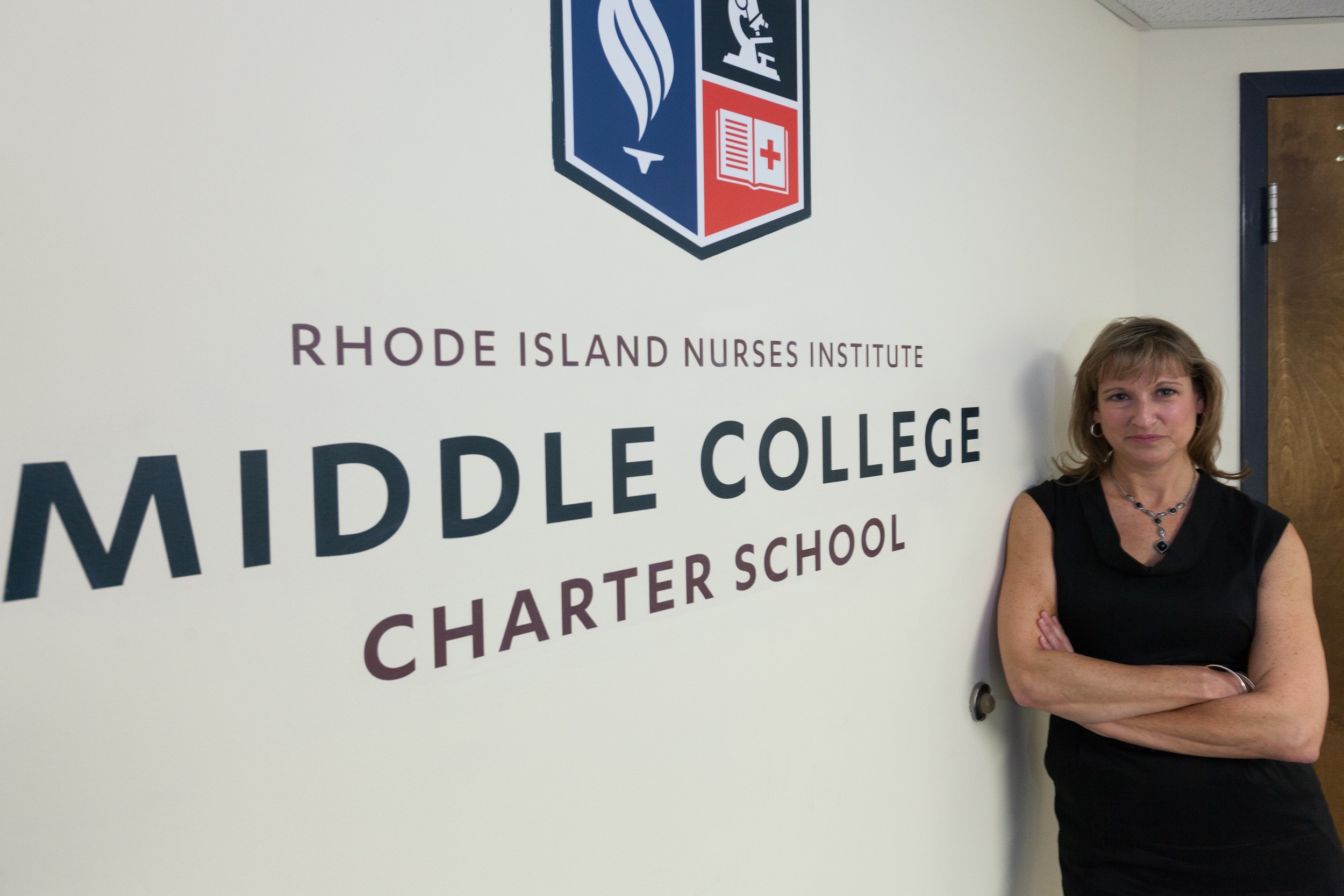Building a local talent pipeline for nurses in a patient-centric world
R.I. Nurses Institute Middle College will graduate its first 59 students in 2014
For the knowledge economy in Rhode Island to take hold, it needs to ensure that everyone in the ecosystem can participate and share in the benefits.
As a way to foster greater collaboration, why not coordinate a way for the nursing students at RINI-MC to have supervised access to the anatomy classrooms at the med school and at the new physician assistant studies center?
PROVIDENCE – The future looks very bright for the 272 students currently enrolled in the Rhode Island Nurses Institute Middle College Charter High School, or RINI-MC, the first charter school in the United States that is dedicated to the nursing profession.
The starting salary for an RN with a B.S. degree is about $50,000 a year, according to Pamela L. McCue, the school’s CEO, and a nurse practitioner or a nurse in specialty care can earn as much as $120,000 a year.
The four-year public school, founded in 2011, includes students in grades 10, 11, 12 and 12+. The aim is to provide the academic foundation for local Rhode Island students to continue in college and pursue a four-year degree in nursing – and the pathway to a good-paying career in health care.
Unlike traditional high school, the middle college is run much like a college program, with students treated as young adults – and, in turn, expected to behave as young adults. There is, for instance, no detention. If a student is consistently late, he or she meets with administrators to find out the reasons why, according to McCue.
The results to date have been impressive. The innovative school, straddling the learning ground between high school and college, was rated one of the Top 10 High Schools in Rhode Island by RI-CAN in 2013, successfully closing the achievement gap. It ranked No. 4 for low-income student performance, No. 5 for Hispanic student performance, and No. 4 for African-American student performance, with 58 percent of its students at or above proficiency.
Students exceeded statewide averages in 2012 for proficiency in reading by 8 percent and for proficiency in writing by 22 percent.
In addition, students at RINI-MC demonstrated the highest proficiency growth of any school in Rhode Island in reading (21 percent) and math (15 percent) between 2011 and 2012.
The first class of 59 students will graduate in June of 2014.
Jayson Albuerme, 17, who came to RINI-MC from Cranston East High School, told ConvergenceRI he plans to pursue a career as a nurse practitioner, looking to attend the University of Rhode Island when he graduates. “This school welcomed me with open arms; they really appreciate me here,” he said.
Unlike his previous experience in high school, which he said didn’t push him to reach his potential, Albuerme continued, “In this school, they give you motivation to succeed and move on. We’re more of a family than a student body,” he said. The actual classroom experience, with smaller class sizes, allows for more one-on-one interactions with teachers.
Kerline Debras, 18, one of original students now in 12+ who will graduate in June, said the educational curriculum had helped her find focus in pursing a career in nursing. The opportunities to work as a Certified Nursing Assistant in hospitals and nursing homes as part of her education had made a big difference, Debras told ConvergenceRI.
“I really like the whole feeling of helping people,” she said. “While I was working at the hospital, the patients were very friendly. Patients told me: ‘You’re going to be a great nurse.’”
Debras, like Albuerme, praised the college atmosphere of the school and the pre-requisite college courses that are taught. “Teachers are really close to the students, they talk to students,” Debras said, creating a much different learning atmosphere than the one she left at Central High School.
The woman behind the driving wheel
The driving force behind RINI-MC is McCue, a born-and-bred Rhode Islander. She earned her bachelor’s degree in Nursing at Rhode Island College, her MS in Nursing Administration at the University of Rhode Island, and she began her own nursing career at The Miriam Hospital.
McCue speaks with a passion about the pioneering middle college for nursing – and the future of nursing. She brings out her recently autographed copy of The Institute of Medicine’s report, “Future of Nursing: Leading Change, Advancing Health,” directed by Susan B. Hassmiller, the senior advisor for Nursing at the Robert Wood Johnson Foundation, who toured RINI-MC on Sept. 11.
The recommendations in the report, which form the basis of the national “Future of Nursing: Campaign for Action” being led by Hassmiller, have served as a template for her vision, McCue said.
They include: increase the proportion of nurses with a BSN to 80 percent by 2020, expand opportunities for nurses to lead collaborative improvement in patient care, and remove scope-of-practice barriers.
“I led the charge,” McCue said, talking about the “Advanced Practice Registered Nursing” law by enacted the R.I. General Assembly in 2013, enabling nurses to practice to the full scope of their training.
“We know that there will be a nursing shortage,” McCue said, as the health care delivery system moves toward patient-centric primary care, saying her analysis of workforce needs is backed up by projections by Rhode Island’s largest hospital networks, Lifespan and Care New England. “We see our students [emerging] on the front line of the nursing workforce in Rhode Island,” she said, emphasizing that the school offered an educational pathway with a good-paying job at the end.
McCue said the school prepares and encourages students to pursue their education to earn a four-year bachelors of science nursing degree, at Rhode Island College, Salve Regina University or the University of Rhode Island.
Innovative approach
In addition to the traditional course work in biology, anatomy, psychology, history and writing as well as the opportunities for work experience during the summer at local hospitals and nursing facilities, RINI-MC also includes innovative approaches to teach skills important to nursing, according to McCue.
To help develop better listening and observation skills, McCue said, students are offered a creative course in the art of assessment, studying and drawing portraits, teaching them how to better understand body positioning as well as non-verbal communication.
One of the more innovative programs now being put together at RINI-MC, supported by a grant from the Governor’s Workforce Board, will be to add 45 underemployed and unemployed parents of the current students to the school’s enrollment, providing them with the education and training to become Certified Nursing Assistants.
“We’re building the future nursing workforce in Rhode Island, one that will position nurses at the collaborative center of care,” McCue said.








